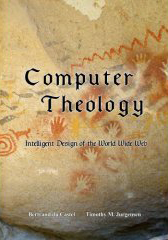PRESS
 |
COMPUTER THEOLOGY |
||||
|
mechanisms. As the reader might infer from the title, we consider religion to
be a significant recurring mechanism of evolution; certainly as it pertains to
multi-level natural selection, a subject we’ll discuss in depth in Chapter 2. The concept of
evolution has been around for a long time. However, while some might suggest
that cursory discussions of what today we think of as evolutionary mechanisms
can be found among the writings of the ancient Greeks, for our purposes, we
will view the seminal establishment of the principles of evolution to be the
products of the XVIIIth and XIXth Centuries in the form
of pioneering research and writings by Jean-Baptiste Lamarck, Charles Darwin
and Gregor Mendel. While there were other players in the game, these particular
innovators were instrumental in forming the context for thought and discussions
about evolution in the form that we know it today. Darwin and Mendel were
actually contemporaries, with Mendel very aware of Jean-Baptiste
Lamarck first gave significant impetus to the concept that members of species
inherited characteristics from their progenitors. He proposed a model for the
evolutionary process. A summary of his basic views is found in his work Philosophie zoologique. There he offers
the following assessment (our translation): So,
any change acquired in an organ through a habit of sufficient usage for having
effected it, conserves itself through generation, if it is common to the
individuals who, in fecundation, concur together to the reproduction of their
species. Finally, this change propagates itself, and so passes into all
succeeding individuals subject to the same circumstances, without them having
to acquire it the way it was really created. Thus, Lamarck formalized
the idea that change that occurs within an organism can be propagated into
succeeding generations. Such change, even if it occurs in minute steps, could
have a cumulative effect over time. In his view, the impetus for change was an
organism’s need to adapt to its specific environment. In other words, the
environment was the agent that stimulated change within the organism. Charles
Darwin modified the proposition as follows in The Origin of Species: How
much of the acclimatisation of species to any peculiar climate is due to mere
habit, and how much to the natural selection of varieties having different
innate constitutions, and how much to both means combined, is a very obscure
question. That habit or custom has some influence I must believe, both from
analogy, and from the incessant advice given in agricultural works, even in the
ancient Encylopaedias of China, to be very cautious in transposing animals from
one district to another; for it is not likely that man should have succeeded in
selecting so many breeds and sub-breeds with constitutions specially fitted for
their own districts: the result must, I think, be due to habit. On the other
hand, I can see no reason to doubt that natural selection will continually tend
to preserve those individuals which are born with constitutions best adapted to
their native countries. As we see, Charles Darwin, without obliterating Larmarck’s view, added natural selection, the proposition that within the evolutionary process the environment may judge the efficacy of change |
||||
|
||||
© Midori Press, LLC, 2008. All rights reserved for all countries. (Inquiries) The contents of ComputerTheology: Intelligent Design of the World Wide Web are presented for the sole purpose of on-line reading to allow the reader to determine whether to purchase the book. Reproduction and other derivative works are expressly forbidden without the written consent of Midori Press. Legal deposit with the US Library of Congress 1-33735636, 2007.
|
ComputerTheology Intelligent Design of the World Wide Web Bertrand du Castel and Timothy M. Jurgensen Midori Press, Austin Texas 1st Edition 2008 (468 pp) ISBN 0-9801821-1-5 |
Book available at Midori Press (regular) |